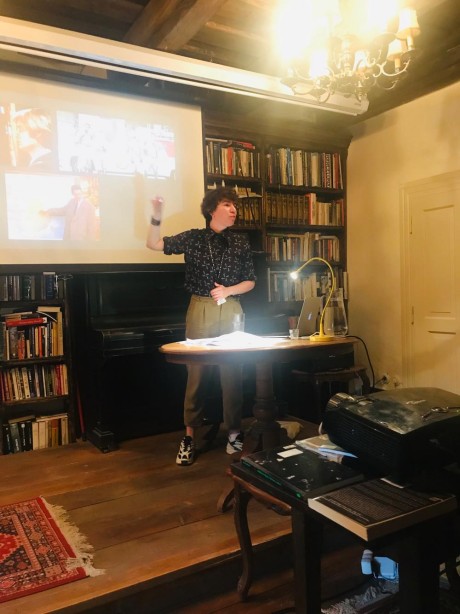


Ex Oriente First Session 2019

… with the subtitle ”Find Your Way – Vision – Space and Storytelling” here in Banská Stiavnoca in Slovakia – is going to its end. Two more program points, exiting both of them, and then a summing up tomorrow. First one: I have just listened to Bosnian director Alen Drljevic talk about his “Men don’t Cry” that we saw yesterday, a fiction film with a documentary background on a group therapy session with former soldiers in the different armies during the Yugoslav war.
I am writing this in the cinema, where I am to watch ”Forman vs. Forman”, a private screening for the Ex Oriente participants of the film by Jakub Hejna and Helena Trestikova, the film about Milos Forman that premiered in Cannes and has its Czech premiere at the upcoming Karlovy Vary Film Festival. I just saw a clip of the master, he will be on screen in half an hour…
The Ex Oriente workshop is perfectly organised by the IDF staff (Institute of Documentary Film). There is the right balance between the discussion of the 12 selected projects and the lectures, or call them interventions, on production and visualisation AND screenings of full films and clips and comments. I have in previous posts written about Jan Gogola and Robo and Filo (Robert Kirchhoff and Filip Remunda) and their jazz-film, which is much more than a jazz film and with this post I would like to draw your attention to
Dalia Neis (PHOTO), multi-artist from London, living in Berlin. She came up with an inspiring talk full of surprises called “Spectral Glitches, Eerie Terrains & The Unfilmable”. She took us to a clip by Joris Ivens, “Pour le Mistral” from 1966, where he was filming the unfilmable, and to a clip from American Kuca (? Did not get the name, sorry), who had another approach to filming the wind – Neis is publishing a book on The Wind, that comes out in September. She then showed us her own film, Jewish theme, shot in Krakow, experimental “Missing Meilich” from 2004, supported by Carré Noir of RTBF, at the days where there was a commissioning editor, who was allowed to take chances, Christiane Philippe. Who I remember from my EDN-time and many pitching sessions. Neis said that she found out that she had to go for another medium, and she did, telling us about her interest in sound – “how a soundtrack can represent a reality that we can´t see”. She has published sound tapes and one that she let us listen to had been picked up the filmmaker Tatia Shé, named “Biolystok”, around 4 minutes long. Neis quoted a lot of philosophers and introduced a terminology connected to some of them – I did not get it on this occasion but I will definitely follow her work. To get a bit away from the documentary, sometimes good for your health.
Back to Jan Gogola, who seems to be involved in most of the significant Czech and Slovak documentaries. And you sense it, when the directors of these films talk like him about dramaturgy and exposition and what do I know, not to forget his “open structure” ideas that took me years to understand, until I saw the films of Peter Kerekes, “66 Seasons” and “Cooking History”. Gogola had a brilliant session called “Something Else”, which it was, indeed. He showed, and analysed scenes from Vit Klusak’s “The World According to Daliborek”, “2-0” by Abraham, with fantastic scenes from a football stadion where there is a focus on what happens outside the pitch – two kids talking about the teeth that they have or are about to fall out, intellectuals in conversation about former president Vaclav Klaus behaving badly abroad, a film that portrays a society and many many more clips, including one from the “Forman vs Forman” documentary, I was waiting for, while writing this.
And there it came on the screen, a coproduction with arte by Czech Television, with production houses Negative from Prague and Alegria from Paris. A well made biography with wonderful archive with the director, who left his country for political reasons, made himself a great career in the US, went back to film “Amadeus” in Prague under strict surveillance and again back in 1989 to celebrate with his friend Vaclav Havel and the people of Czekoslovakia. With clips from his films, of course, I have seen them all. Wonderful to be reminded of. In one scene where he is watching on television “Amadeus”, he says that he feels like Salieri in comparison with Antonioni, Fellini, Visconti… well, a man who left us The Firemen’s Ball, Loves of A Blonde, One Flew Over…, Amadeus, Hair… has nothing to regret!